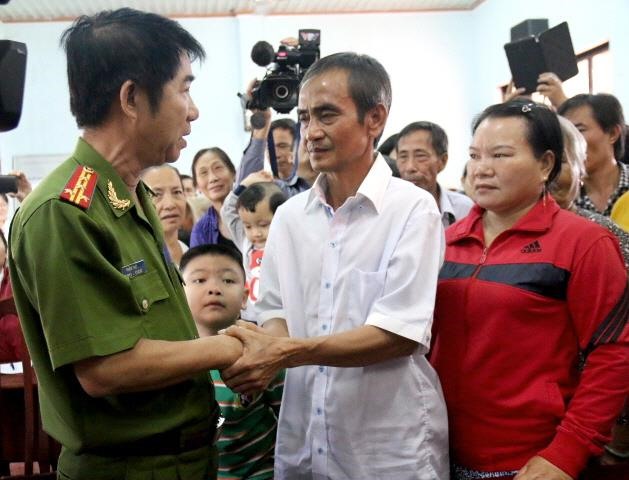 Politics & Law
Politics & Law

The State needs to take responsibility and apologise to people who were wrongfully sentenced, National Assembly deputies said yesterday.
 |
| Deputy Director of Bình Thuận Province's Police Department Phạm Thật (left) congratulates Huỳnh Văn Nén (in white) for being declared innocent and freed from prison after Nén spent more than 17 years in jail on murder charges. — VNA/VNS Photo Nguyễn Thanh |
HÀ NỘI – The State needs to take responsibility and apologise to people who were wrongfully sentenced, National Assembly deputies said yesterday.
At a session to discuss the draft amended Law on State’s responsibility on Compensation, Nguyễn Khắc Định, vice chairman of the NA Law Committee, presented the report of the NA Standing Committee on amending the draft law.
Định said there some believe the State needs to compensate and apologise to those who are wrongfully convicted, but the Standing Committee thought differently.
“The right to protect one’s reputation includes the right to deny information that does harm to their reputation and the right to ask for a public apology and compensation. But if the Law requires the State to apologise without a request, this take the matter out of the hands of the wrongfully convicted,” Định said.
He added that the Standing Committee asked the drafters of the law to add a requirement for the agency in charge of compensating the wrongfully convicted to clarify if they want a public apology.
Deputy Nguyễn Thị Thủy from Bắc Kạn, said that the apologies must be compulsory.
“It’s not a matter of someone’s reputation being damaged by information, but being damaged by an agency. So protecting the pride of the wrongfully convicted must be the responsibility of the State and not a simple civic matter,” Thủy said.
Deputy Lưu Bình Nhưỡng from Bến Tre Province, agreed, saying that a “request for an apology was not necessary”.
“We’re building a State that works for the people, we have to be fair with the people. We can’t do something right only when the people ask for it,” he said.
Regarding compensation for families of the wrongfully convicted who have died, deputies agreed that compensation should only be given to the closest heir/next of kin.
“This is feasible and rational – we can’t compensate every relative of the wrongfully convicted if they die, it would be very complicated,” deputy Đào Tú Hoa from Hà Nội said.
However, deputy Bùi Văn Xuyền from Thái Bình Province, said the amount stipulated in the draft amended law was too high. The draft law stipulated that compensation to the closest heirs/next of kin of the wrongfully convicted die is equal to 360 months of basic salary. Xuyền asked for an explanation as to why this rate was chosen.
On compensation rate, many deputies said the specific calculation of the compensation should be included in the Law, because current regulations do not mention it specifically.
Vietnamese and foreign individuals and organisations lawfully in Việt Nam that suffer material or mental sufferings caused by the State are entitled to compensation under the Law on State Compensation Liability.
According to a Justice Ministry report, the law contains legal provisions on compensation for damage caused by the State, putting an end to the current parallel existence of two legal mechanisms on damage compensation in administrative management and criminal proceedings.
The law provides for state compensation liability in administrative management, legal proceedings and judgment enforcement.
Draft Programme for building laws, ordinaces in 2018
Discussing about the programme on building laws, many deputies agreed it that has made positive changes. Documents on implementation had become more relevant. However, the implementation of the programme still had shortcomings. The quality of preparation for some projects is still lacking.
On the same day, deputies discussed the draft programme for building laws, ordinances in 2018 and the draft programme on supervision activities of the National Assembly in 2018. Deputies agreed that from 2018 onwards, no more than three projects will be assigned to a drafting agency or appraisal body, except in special cases.
They also agree to reduce the number of projects included in the programme of the year-end session to devote time to the National Assembly to consider socio-economic and state budget contents and amendments and additions to new laws that are promulgated or recently enforced.
Projects that are not up snuff or fail to submit records in time should be withdrawn from the programme or drafters should request a delay in submission to continue their preparation.--VNS




